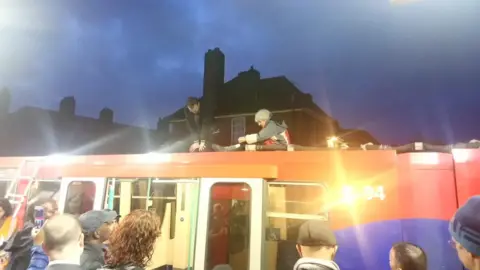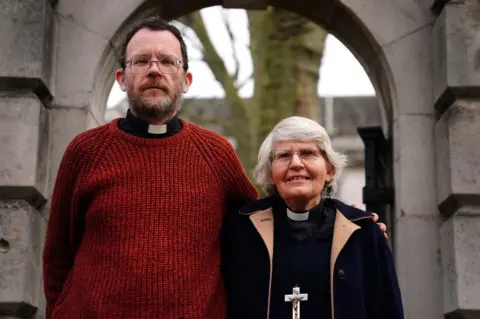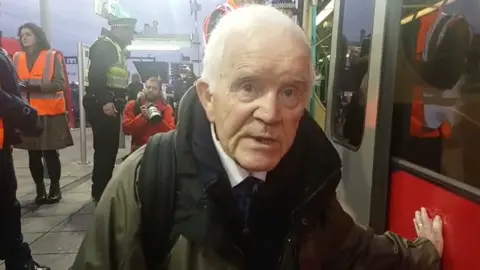Extinction Rebellion: Jury clears protesters who climbed on train roof
 Extinction Rebellion
Extinction Rebellion Two climate change activists who sat on the roof of a rush-hour train in east London have been cleared of obstructing a carriage on the railway.
The Rev Sue Parfitt, 79, and Fr Martin Newell, 54, climbed on the Docklands Light Railway (DLR) carriage at Shadwell station on 17 October 2019.
A third activist, Philip Kingston, 85, superglued his hand to the train.
Speaking outside Inner London Crown Court, Ms Parfitt said: "It's wonderful that the jury saw the bigger picture".
Mike Schwarz, solicitor at the law firm Hodge Jones and Allen which represented the defendants, described the verdict as being part of an "escalating pattern".
He said: "There is mounting evidence from the courts and in particular from juries that the public is taking the climate crisis and the increasingly urgent need to focus on it far more seriously than government and business."
The verdict comes after four people were recently cleared of criminal damage over toppling the statue of slave trader Edward Colston in Bristol and throwing it in the harbour.
 PA Media
PA MediaSpeaking outside the court, Fr Newell was asked if he was planning to disrupt public transport again. He replied: "I'm not sure that disrupting public transport is the right thing to do at this point, but in terms of would I risk going to prison? Absolutely."
Ms Parfitt, 79, said she felt the verdict showed that the protest had been "the right thing to do".
She said: "It's wonderful that the jury saw the bigger picture, that the court has vindicated our action and we hope it in some small way inspires others to feel that there may be sacrifices to be made, perhaps particularly by people of faith."
Last month, the Anglican priest admitted she was "surprised" to avoid jail for blocking the M25.
She was one of seven members of Insulate Britain who were handed suspended sentences for breaching an injunction and being in contempt of court. Two others were jailed.
'Put others first'
During this trial the jury had heard that the trio were strongly motivated by their Christian faith while Mr Kingston's grandchildren also influenced his participation.
The ex-university lecturer, from South Gloucestershire, said he had been trying "to put others first" during the protest which disrupted services for 77 minutes and led to 15 trains being delayed or cancelled.
 Extinction Rebellion/PA
Extinction Rebellion/PAThe jury heard that some passengers told the environmentalists that the train they had targeted was an electric train - one of the greenest modes of transport - and should therefore not be the focus of the protest.
The court heard the DLR service, which was travelling from Lewisham to Bank shortly before 07:00 BST, had been at about 70% capacity.
In what they said was an attempt to appeal to the public and the government about the dangers of climate change and the financial institutions whose actions damage the planet, the defendants targeted a train one stop away from Bank, in the City of London's financial district.
This was partly because, according to the activists, they had planned the demonstration to ensure there was no risk to public safety, by taking measures including targeting a station above ground and having 10 Extinction Rebellion activists on the platform to ensure violence did not break out.
Fr Newell said: "I'm very grateful to the jury to acting on their conscience and hearing the issues that we wanted to raise in the original action two and a half years ago.
"The climate emergency is the biggest issue facing the human race in our time and nothing is more important with dealing with that and despite the words that many governments have said about being more urgent, they're just not doing it."
